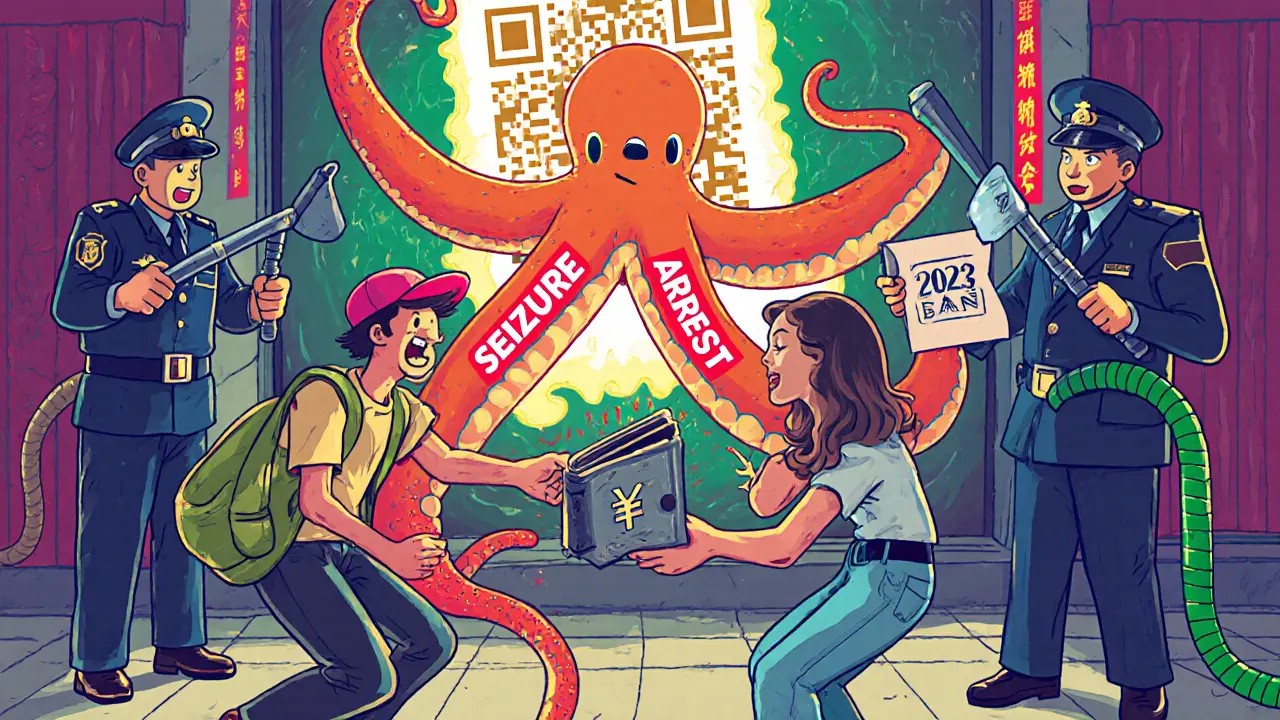China Crypto Compliance Checker
Check Your Crypto Activity in China
China has banned all cryptocurrency activities. This tool helps you understand if your specific crypto activity would be legal or illegal according to Chinese regulations.
There is no such thing as crypto taxation in China - not because the government forgot to write the rules, but because owning, trading, or mining cryptocurrency is illegal.
China doesn't tax crypto. It bans it.
If you're looking for a tax form for your Bitcoin gains in China, you won't find one. That's not an oversight. It's by design. Unlike the U.S., Canada, or even Japan, where crypto profits are taxed like capital gains, China has taken a hardline stance: no crypto, no taxes. The moment you buy, sell, or mine Bitcoin, Ethereum, or any other digital asset inside China, you're breaking the law. This isn't a recent shift. It's the end result of a 16-year campaign to erase cryptocurrency from China's financial system. The first warning came in 2009, when authorities blocked virtual currencies from being used to buy real goods. That was just the start. By 2013, banks were ordered to stop handling Bitcoin transactions. In 2017, initial coin offerings (ICOs) were shut down. In 2021, mining operations were forced to shut down nationwide because of energy use. And on June 1, 2025, everything changed. The People's Bank of China issued a sweeping ban that made it illegal to own, trade, or mine cryptocurrency. Not just businesses - individuals too. If you have Bitcoin in a wallet, you're not breaking the law just by holding it. But if you try to sell it, send it, or even mention it in a contract, you're in serious trouble.What happens if you get caught?
There are no tax penalties. There are no fines for unreported gains. Instead, there are seizures, account freezes, and criminal charges. Authorities don't care how much you made. They care that you traded at all. Any profit from crypto is treated as illegal proceeds. That means the government can and will take your coins - and your money - without compensation. Banks are required to monitor accounts for crypto-related activity. If they spot a transaction to a known exchange or mining pool, they report it. Your account gets frozen. You get questioned. If you're a business owner, you could face charges for illegal fundraising or financial fraud. Foreigners aren't exempt. If you're visiting Shanghai, living in Beijing, or working remotely from Shenzhen, the same rules apply. No exceptions. No diplomatic immunity. No gray area. The ban is absolute.Why did China go this far?
China didn't start out hostile to crypto. In fact, it was one of the biggest markets. In 2017, over 70% of global Bitcoin mining happened in China. The country produced more than half of all new Bitcoin. But as adoption grew, so did the risks - from capital flight to speculative bubbles to money laundering. The government's solution wasn't regulation. It was elimination. By banning crypto, China removed the entire problem: no trading means no volatility, no tax evasion, no offshore wealth moves. It also cleared the way for its own digital currency - the digital yuan. The People's Bank of China controls every transaction, every balance, every flow of money. There's no anonymity. No decentralization. No risk of losing control. Compare that to the U.S., where the IRS treats crypto like property and demands you report every trade. Or the EU, where member states impose VAT on crypto exchanges. China didn't want to manage the system. It wanted to replace it.Is there any legal way to hold crypto in China?
Technically, no. But the law has a weird loophole: private ownership isn't explicitly criminalized - only activities around it are. If you bought Bitcoin in 2020 and never touched it since, the government won't knock on your door just because you have it. But if you try to sell it to a friend, use it to pay for something, or even tell someone you own it in writing - you're breaking the law. Contracts involving crypto are void. Courts won't enforce them. If someone steals your coins, you can't sue. If you lend crypto to a friend and they don't pay back, there's no legal recourse. Your assets exist in a legal vacuum - unregulated, unprotected, and at constant risk of seizure.
What about mining?
Mining is dead in China. Not just discouraged - outlawed. In 2021, authorities shut down over 80% of the world's Bitcoin mining capacity overnight. Data centers were unplugged. Power supplies were cut. Equipment was confiscated. The government cited energy waste and financial instability as reasons. And they were serious. Miners who tried to hide their operations were fined, jailed, or both. Today, any new mining rig in China is an instant red flag. Power companies monitor usage patterns. If a household suddenly uses 15,000 kWh a month - enough to run dozens of ASIC miners - the authorities show up. No warning. No notice. Just shutdown.What about the digital yuan?
China's answer to crypto isn't regulation. It's control. The digital yuan (e-CNY) is a central bank digital currency (CBDC) issued and monitored by the People's Bank of China. Unlike Bitcoin, it's not decentralized. Every transaction is tracked. Every user is verified. There's no anonymity. You can't send it to someone without the state knowing who you are and what you bought. The government promotes the digital yuan as more convenient, secure, and efficient than cash or crypto. And it's working. Over 260 million people have used it for daily payments - from street vendors to subway rides. The goal isn't to compete with crypto. It's to replace it entirely.What's changing in 2025?
In July 2025, officials in Shanghai held a closed-door meeting to discuss digital assets. Some experts suggested China might soften its stance - especially around stablecoins and tokenized assets. But no policy changed. No law was amended. The meeting didn't signal a return to crypto. It signaled a recalibration. The government is watching how other countries use blockchain for trade settlement, supply chains, and asset tokenization. But it won't allow decentralized systems. Any future move will be state-controlled, centralized, and fully monitored.
How does this compare to the rest of the world?
Most countries tax crypto. China bans it. In Taiwan, crypto trading is taxed at 5% VAT. In South Korea, you pay 20% on profits. In the U.S., you report every trade to the IRS. Even countries like Nigeria and Vietnam, where crypto is popular, still require tax filings. China is the only major economy that treats crypto like a drug - not an asset. Possession isn't illegal, but any activity around it is. That makes enforcement harder, but also more absolute.What should you do if you're in China?
If you're living in China and you own crypto, your safest move is to do nothing. Don't trade. Don't send. Don't mine. Don't even talk about it in writing. Keep your wallet offline. Don't link it to any Chinese bank account. If you're planning to leave the country, consider transferring your assets before you go - but know that doing so could still trigger scrutiny if you're flagged. If you're a business owner, avoid any crypto-related services. Even offering to accept crypto as payment - even if it's for a foreign client - could get your company shut down. There is no legal workaround. No tax advisor can help you. No accountant can file a return. The system doesn't recognize crypto as property. It recognizes it as a threat.What’s next?
China's stance might look extreme. But it's working - for them. The digital yuan is now integrated into daily life. Financial control is tighter than ever. Capital flight has dropped. Crypto speculation has vanished from the mainstream. The rest of the world still taxes crypto because they believe it's here to stay. China believes the only way to win is to erase it. And so far, they've won. If you're outside China and wondering whether this model could spread - don't count on it. Most governments want to tax crypto, not ban it. But if China's digital yuan becomes the global standard for CBDCs, other countries may follow its lead - not by banning crypto, but by replacing it with something they control.Is it illegal to own Bitcoin in China?
Owning Bitcoin or other cryptocurrencies isn't explicitly illegal, but there's no legal protection for it. If you hold crypto, the government won't help you if it's stolen, lost, or seized. Any attempt to trade, sell, or use it is against the law.
Do I have to pay crypto taxes in China?
No, because there are no crypto taxes in China - there are no crypto transactions allowed. The government treats crypto activity as illegal, not taxable. Any profit from crypto is considered illicit and subject to confiscation.
Can I mine cryptocurrency in China?
No. All cryptocurrency mining has been banned since 2021. Any mining equipment is subject to seizure, and operators face fines or criminal charges. Power companies monitor usage and report suspicious activity to authorities.
What happens if I send crypto to someone in China?
Sending crypto to someone in China is considered an illegal financial transaction. The recipient could face account freezes, fines, or criminal charges. Banks and payment processors monitor for crypto transfers and report them automatically.
Is the digital yuan the same as Bitcoin?
No. The digital yuan is a government-controlled digital currency issued by the People's Bank of China. Every transaction is tracked, and users must be verified. Bitcoin is decentralized, anonymous, and outside state control. The digital yuan exists to replace crypto, not compete with it.
Can foreigners be punished for using crypto in China?
Yes. The ban applies to everyone in China, regardless of nationality. Tourists, expats, and business travelers are subject to the same penalties as Chinese citizens - including account freezes, asset seizures, and criminal charges.
Will China ever legalize crypto again?
It's unlikely. China's goal is to eliminate decentralized crypto entirely and replace it with the digital yuan. While officials are studying blockchain applications for enterprise use, they have shown no interest in legalizing Bitcoin or other public cryptocurrencies. Any future changes will be state-controlled, not decentralized.

Comments (18)
sky 168
November 21, 2025 AT 11:23
China doesn't tax crypto because it doesn't want to deal with it at all
Devon Bishop
November 23, 2025 AT 06:32
man i used to mine btc in chengdu back in 2018, we had like 30 rigs in a warehouse, one day the power just got cut and the cops showed up with a list of serial numbers. we lost everything. no warning, no fines, just gone. now i just use the digital yuan for groceries, its weird but kinda nice not having to worry about prices jumping
sammy su
November 23, 2025 AT 10:18
if you live in china and you have crypto just keep it offline and dont talk about it. i know a guy who sent 0.5 btc to his cousin in shenzhen and his bank account got frozen for 6 months. they didnt fine him, they just made him prove he didnt do anything illegal. it was a nightmare. better to just leave it alone
jack leon
November 24, 2025 AT 20:22
THEY DIDN’T JUST BAN CRYPTO - THEY ERASED IT FROM THE CULTURE. NO MORE MIDNIGHT MINING RACES, NO MORE COINMARKETCAP CHATS, NO MORE HOPING THE NEXT ALTCOIN WILL MAKE YOU RICH. CHINA DIDN’T PLAY THE GAME - THEY CHANGED THE BOARD. AND NOW? EVERYONE ELSE IS STILL TRYING TO TAX IT WHILE CHINA’S BUILDING A DIGITAL MONOLITH THAT WATCHES EVERY SPEND. IT’S NOT A BAN. IT’S A REINVENTION.
Chris G
November 26, 2025 AT 19:38
crypto ownership isn't illegal but any transaction is. courts won't recognize smart contracts. stolen coins = your problem. this isn't regulation this is digital feudalism
Ashley Finlert
November 26, 2025 AT 21:49
What fascinates me is how China’s approach reveals a fundamental philosophical divide: the West sees crypto as an asset to be managed, while China sees it as a threat to sovereignty. The digital yuan isn’t an alternative - it’s the antidote. No decentralization, no volatility, no loss of control. It’s not about money. It’s about power. And power, in Beijing’s view, must be centralized, visible, and absolute.
Chris Popovec
November 28, 2025 AT 18:37
obviously this is all part of the deep state’s plan to track every penny you spend. they’re using the digital yuan to build a social credit blockchain that links your crypto history to your job, your family, your medical records. next thing you know, you can’t buy milk if you once held eth. this isn’t economics - it’s Orwell on steroids. they’re not banning crypto… they’re banning freedom
Marilyn Manriquez
November 30, 2025 AT 03:22
It is remarkable how China has chosen to eliminate a disruptive force rather than attempt to regulate it. Other nations cling to taxation frameworks, believing they can harness the energy of decentralized finance. But China recognized that true stability requires control - not compromise. The digital yuan is not merely a currency; it is a statement of national order.
taliyah trice
November 30, 2025 AT 18:01
so if you have btc in china you just hide it and dont move it? thats wild
Charan Kumar
December 1, 2025 AT 16:17
in india we tax crypto but here in china they just make it disappear. i think china is right. why tax something that shouldnt exist
Peter Mendola
December 3, 2025 AT 02:50
They’re not banning crypto. They’re banning dissent. 💀
Terry Watson
December 4, 2025 AT 23:59
Wait - so you can technically own crypto… but if you even whisper about selling it, you’re a criminal? That’s not a loophole - that’s a trap. The government sets up the rules so that anyone who dares to touch their coins becomes an instant suspect. It’s psychological warfare disguised as financial policy. And honestly? It’s terrifyingly effective.
Sunita Garasiya
December 6, 2025 AT 11:44
China banned crypto so they could have a currency where the state knows if you bought noodles or a yacht. Meanwhile, the US is still arguing whether a meme coin is property or a hobby. Who’s the real dystopia?
Mike Stadelmayer
December 7, 2025 AT 17:58
the fact that you can hold btc but not use it is like owning a gun you can’t load or point. it’s just there. silent. useless. but still dangerous in their eyes. i kinda respect that. no gray areas. no tax forms. just ‘don’t do it’
Norm Waldon
December 8, 2025 AT 22:40
China’s digital yuan is a surveillance tool disguised as innovation - and the world is too busy laughing at Bitcoin to notice they’ve already won. The moment any country adopts a CBDC with full traceability, they’re signing up for the same prison. This isn’t progress. It’s the end of financial privacy. And we’re all next.
neil stevenson
December 9, 2025 AT 12:07
just keep your coins in a cold wallet and pretend they’re collectible stamps 😅
Jack Richter
December 10, 2025 AT 09:51
so if i move to china with my btc, i just stare at it forever? no trading, no sending, no talking about it? that’s it? no taxes, no rules, just… silence?
Khalil Nooh
December 11, 2025 AT 01:47
THIS IS THE FUTURE. NOT TAXATION. NOT REGULATION. NOT EVEN SUPERVISION - BUT ERASURE. CHINA DIDN’T JUST OUTLAW CRYPTO. THEY MADE IT A MEMORY. WHILE THE WEST ARGUES ABOUT CAPITAL GAINS, CHINA IS BUILDING A FINANCIAL SYSTEM WHERE THE ONLY THING THAT MATTERS IS WHAT THE STATE ALLOWS. THE DIGITAL YUAN ISN’T COMPETING WITH BITCOIN - IT’S REPLACING THE WHOLE IDEA OF MONEY. AND IF YOU THINK THIS WON’T SPREAD? YOU’RE NOT LOOKING CLOSE ENOUGH.